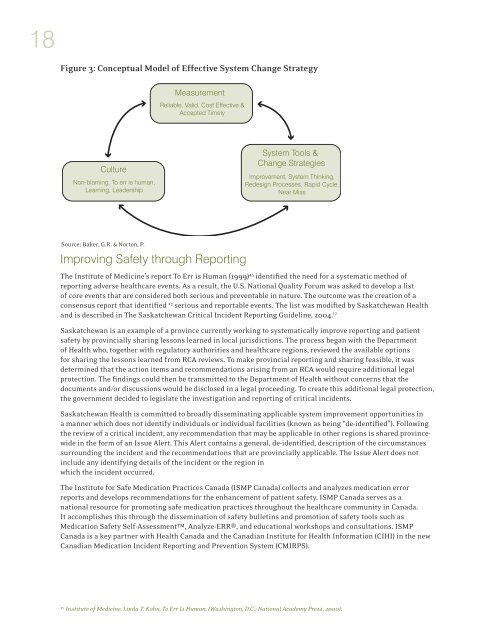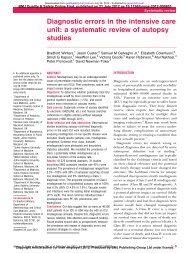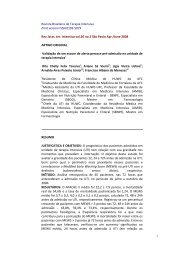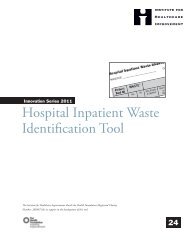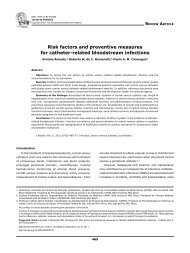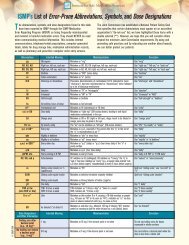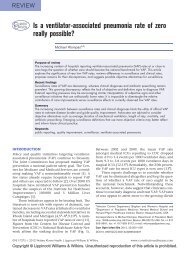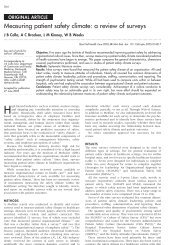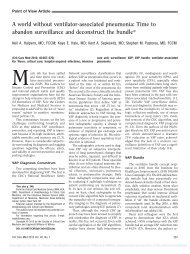18Figure 3: Conceptual Model <strong>of</strong> Effective System Change StrategySource: Baker, G.R. & Norton, P.Improving Safety through ReportingThe Institute <strong>of</strong> Medicine’s report To Err is Human (1999) 45 identified the need for a systematic method <strong>of</strong>reporting adverse healthcare events. As a result, the U.S. National Quality Forum was asked to develop a list<strong>of</strong> core events that are considered both serious and preventable in nature. The outcome was the creation <strong>of</strong> aconsensus report that identified 27 serious and reportable events. The list was modified by Saskatchewan Healthand is described in The Saskatchewan Critical Incident Reporting Guideline, 2004. 17Saskatchewan is an example <strong>of</strong> a province currently working to systematically improve reporting and patientsafety by provincially sharing lessons learned in local jurisdictions. The process began with the Department<strong>of</strong> Health who, together with regulatory authorities and healthcare regions, reviewed the available optionsfor sharing the lessons learned from RCA reviews. To make provincial reporting and sharing feasible, it wasdetermined that the action items and recommendations arising from an RCA would require additional legalprotection. The findings could then be transmitted to the Department <strong>of</strong> Health without concerns that thedocuments and/or discussions would be disclosed in a legal proceeding. To create this additional legal protection,the government decided to legislate the investigation and reporting <strong>of</strong> critical incidents.Saskatchewan Health is committed to broadly disseminating applicable system improvement opportunities ina manner which does not identify individuals or individual facilities (known as being “de-identified”). Followingthe review <strong>of</strong> a critical incident, any recommendation that may be applicable in other regions is shared provincewidein the form <strong>of</strong> an Issue Alert. This Alert contains a general, de-identified, description <strong>of</strong> the circumstancessurrounding the incident and the recommendations that are provincially applicable. The Issue Alert does notinclude any identifying details <strong>of</strong> the incident or the region inwhich the incident occurred.The Institute for Safe Medication Practices <strong>Canada</strong> (ISMP <strong>Canada</strong>) collects and analyzes medication errorreports and develops recommendations for the enhancement <strong>of</strong> patient safety. ISMP <strong>Canada</strong> serves as anational resource for promoting safe medication practices throughout the healthcare community in <strong>Canada</strong>.It accomplishes this through the dissemination <strong>of</strong> safety bulletins and promotion <strong>of</strong> safety tools such asMedication Safety Self-Assessment, Analyze-ERR®, and educational workshops and consultations. ISMP<strong>Canada</strong> is a key partner with Health <strong>Canada</strong> and the Canadian Institute for Health Information (CIHI) in the newCanadian Medication Incident Reporting and Prevention System (CMIRPS).45Institute <strong>of</strong> Medicine, Linda T. Kohn, To Err Is Human, (Washington, D.C.: National Academy Press, 2000).
CANADIAN ROOT CAUSE ANALYSIS FRAMEWORKEvents Not Eligible for <strong>Root</strong> <strong>Cause</strong><strong>Analysis</strong>Reviewing critical incidents, and other adverse events,for potential improvement strategies may seem to bea common sense approach to quality improvement.However, in a setting with so many competing demandson services and providers, incidents in healthcare are<strong>of</strong>ten discussed but rarely reviewed in detail. Healthcareproviders involved in the event may be left with a greatsense <strong>of</strong> grief and frustration about the outcome.Occasionally, valuable and committed healthcareproviders leave their pr<strong>of</strong>ession.It is paramount that all healthcare providers clearlyunderstand how their organization will approach thereview and follow up a critical incident. It is equallyimportant that the organization consistently apply theprocesses fairly and in the manner they have previouslyindicated they would. Even one isolated deviation fromthe agreed upon process has the potential for reportingto be driven underground by caregivers fearing that theywill be disadvantaged if they report an incident.It is important to separate human resource processes,such as discipline, from a quality <strong>of</strong> care review. If staffinvolved in the critical incident believe that informationprovided to RCA facilitators will be used in a disciplinaryforum, they are unlikely to be forthcoming with details<strong>of</strong> the incident. The concept <strong>of</strong> a “just culture” has beenproposed, largely based on an organization “possessinga collective understanding <strong>of</strong> where the line should bedrawn between blameless and blameworthy actions.” 46Culture isn’t something that can be implemented solelybased on policy or procedure; rather it needs to beconsistently fostered over time.“To promote a culture in which we learnfrom our mistakes, organizations mustre-evaluate just how their disciplinarysystem fits into the equation. Discipliningemployees in response to honest mistakesdoes little to improve overall system safety.”David Marx, 47Four types <strong>of</strong> incidents are not recommended for amultidisciplinary root cause analysis forum: 481. events thought to be the result <strong>of</strong> a criminal act;2. purposefully unsafe acts (an act where careproviders intend to cause harm by their actions);3. acts related to substance abuse by provider/staff; and4. events involving suspected patient abuse <strong>of</strong> any kind.These types <strong>of</strong> situations may provide examples forsystem-based learning. However, the insights will relateto human resource processes (including individualperformance management) and security systems. It isimportant to protect the integrity <strong>of</strong> the RCA processfrom a situation where there is probability <strong>of</strong> dismissal,disciplinary action, or criminal charges. These fourspecified types <strong>of</strong> incidents should be referred to asuitable administrative process and, where applicable,to a pr<strong>of</strong>essional regulatory body for resolution. Incircumstances where disciplinary or other administrativeaction has been taken, it is still possible to run a parallelRCA. However, it is imperative that information notbe shared from one process to another and that allparticipants are aware <strong>of</strong> the distinction between thetwo processes.Preparing for the <strong>Root</strong><strong>Cause</strong> <strong>Analysis</strong>A Team ApproachEach organization will determine how to operationalizethe RCA framework and ensure consistent application <strong>of</strong>the methodology. Typically, a facilitator (with expertisein RCA) and a leader (with management responsibility,who understands and supports RCA) share primaryresponsibility for conducting, coordinating and reportingeach RCA process in accordance with applicableorganizational policies. See Appendix B for a samplepolicy provided by the Capital Health Authority in Halifax.The success <strong>of</strong> this review depends on the involvement <strong>of</strong>the attending physician, consulting specialist(s), nurses,pharmacists, therapists and other providers who gavecare related to the critical incident, either through theinterview process or direct participation in the eventanalysis (on a voluntary basis). There are two key benefitsto involving the healthcare providers in the RCA process.46James Reason, “Human Error: Models in Management,” British Medical Journal 320 (2000): 768-70.47David Marx, Patient Safety and the ‘Just Culture’: a Primer for Health Care Executives, Report Prepared for MERS-TM (New York, NY:Columbia University, 2001).48Department <strong>of</strong> Veterans Affairs, Veterans Health Administration, National Center for Patient Safety, Patient Safety Improvement/RCA 101Training (Ann Arbor, MI: VA National Center for Patient Safety, 2005), 3.19


